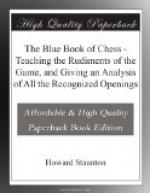WHITE. (Mr. M.) BLACK. (Mr. J.) 1. P. to Q’s 4th. 1. P. to Q’s 4th. 2. P. to Q. B’s 4th. 2. P. to K’s 3d. 3. Kt. to Q. B’s 3d. 3. Kt. to K. B’s 3d. 4. B. to Kt’s 5th. 4. Q. Kt. to Q’s 2d. 5. Kt. to B’s 3d. 5. B. to K’s 2d. 6. P. to K’s 3d. 6. Castles. 7. K. to B’s sq.[A] 7. R. to K’s sq.[B] 8. B. to Q’s 3d. 8. P. takes P. 9. B. takes P. 9. P. to Q. R’s 3d.[C] 10. Castles.[D] 10. P. to Kt’s 4th. 11. B. to Q’s 3d. 11. B. to Kt’s 2d. 12. Q. to K’s 2d. 12. P. to B’s 4th. 13. P. takes P.[E] 13. Kt. takes P. 14. B. to B’s 2d.[F] 14. Kt. to Q’s 4th. 15. B. takes B. 15. Q. takes B. 16. Kt. takes Kt. 16. B. takes Kt. 17. P. to Q. Kt’s 3d. 17. Q. R. to B’s sq. 18. P. to K’s 4th. 18. B. to Kt’s 2d. 19. P. to Q. Kt’s 4th.[G] 19. Kt. to Q’s 2d. 20. K. R. to Q’s sq. 20. Kt. to B’s sq. 21. P. to Q. R’s 3d. 21. R. to B’s 6th.[H] 22. B. to Q’s 3d. 22. K. R. to B’s sq.[I] 23. R. takes R. 23. R. takes R. 24. Q. to Kt’s 2d. 24. R to B’s sq.[J] 25. R. to Q. B’s sq. 25. R. to Q’s sq.[K] 26. B. to Kt’s sq. 26. Kt. to Q’s 2d.[L] 27. Q. to Q’s 4th. 27. Kt. to B’s 3d. 28. Q. to K’s 5th. 28. Kt. to Kt’s 5th. 29. Q. to B’s 4th. 29. Kt. to B’s 3d. 30. P. to R’s 3d. 30. Kt. to K’s sq. 31. Kt. to K’s 5th. 31. Kt. to Q’s 3d. 32. Kt. to Kt’s 4th. 32. Kt. to B’s 5th.[M] 33. P. to K’s 5th. 33. K. to R’s sq. 34. Kt. to B’s 6th. 34. P. takes Kt.[N] 35. Q. to R’s 4th.[O] 35. Resigns.
[Footnote A: Marshall abandons his favorite variation 7. Q. to B’s 2d.]
[Footnote B: Janowsky also changes P. to B’s 4th, played in the earlier games.]
[Footnote C: Janowsky’s favorite manoeuvre, which might have been expected. Therefore Marshall could have played P. takes P. previous to B. to Q’s 3d.]
[Footnote D: P. to Q. R’s 4th would have prevented the Bishop being dislodged; but as he manages eventually to prevent Black from keeping the majority of Pawns on the Queen’s side, there is nothing to be said against it—except that he only keeps about an even game.]
[Footnote E: This is compulsory, because of the threat P. to B’s 5th, followed by P. to Kt’s 5th.]
[Footnote F: B. to Kt’s sq. might be followed by P. to Kt’s 5th, when Q. to K’s sq. would take up the place which the K. R. intends to occupy; but the move would have been better, nevertheless.]
[Footnote G: It is doubtful whether the advance might not have been dispensed with, because of the threat Kt. to Q’s 2d, Kt’s 3d, and B’s 5th eventually. But Marshall plays still for attack, not content with a draw in an even position.]




